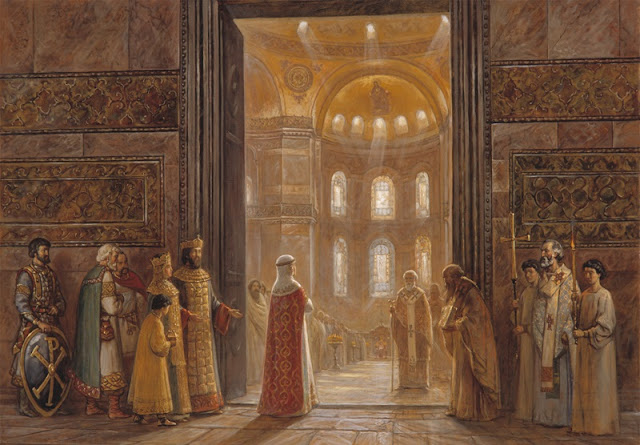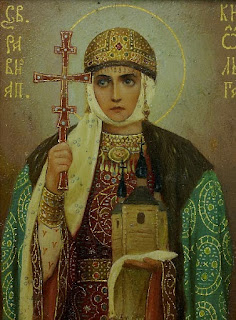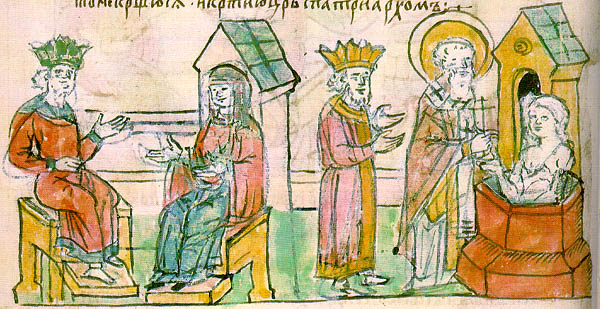“The Originator of faith” and “the
Root of Orthodoxy” – that is how people called Saint Princess Olga many years
ago. Her baptism was marked with the prophetical words of the patriarch, who
baptized her: “You are blessed among the wives of Rus, as you rejected darkness
and turned to light. The sons of your land will honor you till the last family
line”. There are a lot of storiesabout her in the chronicles, but most of the facts about her life cannot be doubted.
 The name of the future Princess and
the first information about her can be found in the most ancient chronicle
called “Primary Chronicle” in the episode of marriage of Prince Igor of Kiev:
“From Pskov they bring the bride for him, called Olga”. After the marriage Igor
went to war on the Greeks, and when he returned he was already a father, as
their son Svyatoslav was born. Soon Igor was killed by ancient tribe of
Drevlians. Being afraid of revenge for the murder of the Prince, they set their
ambassadors to Olga, asking her to marry their leader called Mall. The princes
pretended as if she agreed. She lured with a ruse two groups of ambassadors to
Kiev and sentenced them to painful death. Then her warriors killed 5,000 of
Drevlians near their capital – Korosten. Next year she attacked the city again.
That time they burnt the city to ashes, when they sent there the birds with
burning tows. Those of Drevlians who survived were later sold into slavery.
The name of the future Princess and
the first information about her can be found in the most ancient chronicle
called “Primary Chronicle” in the episode of marriage of Prince Igor of Kiev:
“From Pskov they bring the bride for him, called Olga”. After the marriage Igor
went to war on the Greeks, and when he returned he was already a father, as
their son Svyatoslav was born. Soon Igor was killed by ancient tribe of
Drevlians. Being afraid of revenge for the murder of the Prince, they set their
ambassadors to Olga, asking her to marry their leader called Mall. The princes
pretended as if she agreed. She lured with a ruse two groups of ambassadors to
Kiev and sentenced them to painful death. Then her warriors killed 5,000 of
Drevlians near their capital – Korosten. Next year she attacked the city again.
That time they burnt the city to ashes, when they sent there the birds with
burning tows. Those of Drevlians who survived were later sold into slavery.
At the same time the chroniclers say
she contributed a lot to the development of political and social life in the state.
She managed to strengthen the power of the Prince and centralized the
government. The chronicles note that along with her son and their army, she came
across the Drevlian lands and set up a taxation system. The princes annexed some of their
villages and hunting areas to the territories of Kiev.
In her life story it is said:
“Princess Olga was reigning not just like a woman, but like a strong and wise
man. She was tought when it came to her ruling power and protected her land from the hostiles. The
enemies were afraid of her, but her people loved her, as she was kind and fair.
She had mercy upon the guilty and rewarded the pious. She gave all credit where
credit is due, but she always was wise and prudent”.
As a wise ruler she could see based on the example of the Byzantine Empire, that it was not enough to develop social and political spheres. It was necessary and more important to care about the spiritual life of her people. “The main feat of her was that she could behold the true God. She knew nothing about Christian rules, she led a pure and virtuous life. She wanted to be a Christian by her own will. She felt God with her heart and went to Him without hesitation”. Saint Nestor the Chronicler wrote that “Saint Olga was striving for wisdom since childhood, which is the best thing in the world, but she found much more precious treasure – she found Christ”.
As a wise ruler she could see based on the example of the Byzantine Empire, that it was not enough to develop social and political spheres. It was necessary and more important to care about the spiritual life of her people. “The main feat of her was that she could behold the true God. She knew nothing about Christian rules, she led a pure and virtuous life. She wanted to be a Christian by her own will. She felt God with her heart and went to Him without hesitation”. Saint Nestor the Chronicler wrote that “Saint Olga was striving for wisdom since childhood, which is the best thing in the world, but she found much more precious treasure – she found Christ”.
 The great Princess made her choice
and left the throne for her son, who was old enough to rule. She went to
Constantinople. And in her life story it is stated: “Olga went to the Greeks to
see their service in her own eyes and make sure, that their faith is the true
one”. Here she decided to become a Christian. She was baptized by patriarch
Theofilact of Constantinople, and Emperor Constantine VII become her godfather.
Olga brought to Kiev the icons, the literature and thus her apostolic ministry
began. She built the Cathedral in the name of Saint Nicholas on the grave of
Askold – the first Christian prince of Kiev, and turned many of people to
Christianity.
The great Princess made her choice
and left the throne for her son, who was old enough to rule. She went to
Constantinople. And in her life story it is stated: “Olga went to the Greeks to
see their service in her own eyes and make sure, that their faith is the true
one”. Here she decided to become a Christian. She was baptized by patriarch
Theofilact of Constantinople, and Emperor Constantine VII become her godfather.
Olga brought to Kiev the icons, the literature and thus her apostolic ministry
began. She built the Cathedral in the name of Saint Nicholas on the grave of
Askold – the first Christian prince of Kiev, and turned many of people to
Christianity.
Her apostolic ministry faced strong pagan
resistance. A lot of people among the boyars (nobility) and warriors hated the new faith
and their Princess, and the fact that it was spreading all over the land. The adherents of paganism
hoped that the young Prince Svyatoslav, who rejected his mother’s offers to
accept Christianity. In the “Primary Chronicle” it is said:
“Olga lived with her son Svyatoslav and persuaded him to get baptized, but he
ignored her. But if someone wanted to be baptizes, he did not prohibit. Olga
said often: “Son, I knew God and now I am happy. So would you, if you open your
heart for Him”. But he said: “How can I do this? My warriors will laugh me
down!” She answered: “If you do this, then they will follow you and do this as
well”.
He did not listen to her and lived by the pagan traditions, But he did not know, that one who does not listen to his parents will land in trouble. People say: “He, who does not listen to his father or his mother, will meet his death”. Olga loved her son no matter what and said: “Let it be by God’s will. If He want to have mercy upon my ancestors and my land, the He will make their hearts turn to Him, as He did it for me”.
He did not listen to her and lived by the pagan traditions, But he did not know, that one who does not listen to his parents will land in trouble. People say: “He, who does not listen to his father or his mother, will meet his death”. Olga loved her son no matter what and said: “Let it be by God’s will. If He want to have mercy upon my ancestors and my land, the He will make their hearts turn to Him, as He did it for me”.
At the end of her life she faced a lot
of sorrows. Her son moved to the city of Preslavets, which he wanted to made
the capital of his pagan land. Living in Kiev, Olga taught Christianity to her
grandchildren, but she did not dare to baptize them being afraid of her son’s
wrath. In 968 Kiev was sieged by the Pechenegs. The Saint Princess and her
grandchildren were at grave danger. But Svyatoslav found out about it and came
to rescue them and the city. The enemies were sent running in defeat.
 Saint Olga was seriously ill and asked
her son not to leave Kiev untill she died. She hoped still to turn her son to
God. On her deathbed she exhorted: “Why do you leave me, son? And where are you
going? Looking for something foreign, who do you ask to lead what is yours? Now I want you to do what I ask for: do not leave us till I am dead and buried.
Then you can go wherever you want. When I die, do not perform any pagan ritual,
but allow for my priest and clerics to bury my body in accordance with the Christian traditions”.
Saint Olga was seriously ill and asked
her son not to leave Kiev untill she died. She hoped still to turn her son to
God. On her deathbed she exhorted: “Why do you leave me, son? And where are you
going? Looking for something foreign, who do you ask to lead what is yours? Now I want you to do what I ask for: do not leave us till I am dead and buried.
Then you can go wherever you want. When I die, do not perform any pagan ritual,
but allow for my priest and clerics to bury my body in accordance with the Christian traditions”.
Svyatoslav was in pain, and promised to
comply with all her requests, but he refused again to be baptized. Three days later her
condition got worse. The Saint Princess partook of the Holy Sacraments and began to pray to God, that He would illuminate the Russian land. She foresaw that God would bless her land and many of its people would become saints.
When Prince Vladimir took over the throne,
the relics of Olga were moved to the Church of the Tithes and kept in a
sarcophagus, like it was customary in eastern orthodoxy at that time. Under the grave there was
a small window in the wall, and when believers came there they could see the Holy Relics. Some people could even see a light there, and the others were healed from diseases. But those who did not believe, could not see the relics, but only the
coffin.
 The prophecy about her son came true:
his death was terrible. Svyatoslav was killed by the prince of the Pechenegs,
called Kurey. He cut off Svyatoslav’s head, covered the skull with gold and
made a bowl, from which he drunk at the celebrations. The prophecy about the
Russian land was proved by Olga’s grandson – Saint Prince Vladimir, who became
the baptizer of Rus. The images of Saint Olga and Vladimir complement each
other, as they were the originators of Russian spiritual history. Saint Equal-to-the-apostle
Olga became the “spiritual mother” of the Russian people, who began the
illumination with the true light of Christianity.
The prophecy about her son came true:
his death was terrible. Svyatoslav was killed by the prince of the Pechenegs,
called Kurey. He cut off Svyatoslav’s head, covered the skull with gold and
made a bowl, from which he drunk at the celebrations. The prophecy about the
Russian land was proved by Olga’s grandson – Saint Prince Vladimir, who became
the baptizer of Rus. The images of Saint Olga and Vladimir complement each
other, as they were the originators of Russian spiritual history. Saint Equal-to-the-apostle
Olga became the “spiritual mother” of the Russian people, who began the
illumination with the true light of Christianity.
Source: http://azbyka.ru/days/sv-olga-v-kreshchenii-elena



















CONVERSATION